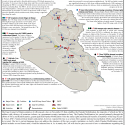 |
 |
Iraq Situation Report: November 18-30, 2016
Nov 30, 2016 - Emily Anagnostos


By Michael Momayezi, Emily Anagnostos, and the ISW Iraq Team
The Iraqi Council of Representatives (CoR) passed a law on November 26 that solidifies the Popular Mobilization, the majority of which are Shi’a militias with a history of sectarian violence, as a permanent security institution in Iraq. The Popular Mobilization Act, passed primarily through the efforts of Shi’a and Kurdish parties, grants qualified Popular Mobilization Units the same rights and financial benefits as members of the Iraqi Security Forces (ISF). Sunni political leaders and parties, however, rejected the law as a serious blow against national reconciliation efforts and called for its reversal. The law’s current language does not address the structure of this new security institution or clarify which Popular Mobilization units, which includes several Sunni units, would be inducted into it. As it stands, the CoR will need to pass successive laws or amendments regarding the Popular Mobilization’s structure, raising a concern that the Shi’a parties’ dominance in the CoR will sway the structure to favor Shi’a militias. The law could benefit Sunnis if it legitimizes the use of local Sunni militias and tribal forces as security forces in majority Sunni provinces, thereby acting as an alternative to the National Guard Law, a key piece of legislation which Sunnis sought as reconciliation efforts but Shi’a parties blocked. National Alliance chairman Ammar al-Hakim and Sadrist Trend leader Muqtada al-Sadr both called for the form of the Popular Mobilization to be non-partisan and inclusive, but sectarian Iranian proxy militias, who already dominate both the PMUs’ leadership and the CoR, are positioned to benefit from the law the most. A legitimized Popular Mobilization will result in a sectarian security force funded by the Iraqi government but responsive to Iranian advisers, which will further alienate Sunnis from the Iraqi Government.